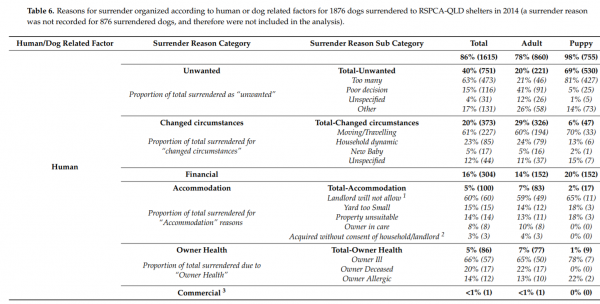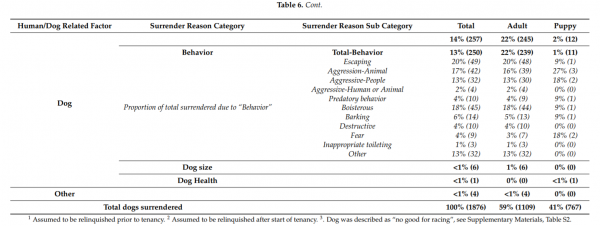As I noted in my previous blog post, the Australia’s ‘dog overpopulation problem’ is often greatly exaggerated by anti-breeding campaigners.
But there were still 110,348 dogs abandoned in our country in 2012, and this is 110,348 too many.
To solve this dog homelessness, we need to consider its source. Is it monsters like me, who (*gasp of horror*) make a living from breeding dogs? Should we therefore all boycott those who deliberately breed?
To answer these questions, we need to consider who these poor dogs are, and where they’re coming from.
While it’s impossible to know the origins of strays found on the street, we do know a bit about dogs surrendered to shelters. Another paper from the UQ Vet school (great work team, keep it up) tracked the origins of 5391 dogs surrendered in QLD between January 2006 and December 2009. Here is what they found:
| Origins | Percentage of Surrendered |
| Own litter | 11% |
| Shelter | 37% |
| Newspaper Advertisement | 12% |
| Pet Shop | 14% |
| Gift | 13% |
| Adopted stray | 3% |
| Breeder | 10% |
Remember, these statistics come from people who’ve taken their dogs to shelters; a different demographic to those who’ve just left them free on the streets. But we can still compare these statistics with those from the 2012 Pet Ownership Survey, which found that 30% of people got their pets from breeders, 20% got them as gifts from friends or neighbours, 16% from pet shops and 15% from shelters. The comparison suggests that people who buy dogs from breeders are, on a whole, far less likely to give them up.
And remember, the term “breeder” covers all manner of sins. As outlined in my other paper, there is a great different between an “ethical” and “unethical” breeder. An ethical breeder should never have one of their dogs (or one of their dog’s descendants) surrendered to the pound, because:
- Their dogs are breed for temperament and properly socialised, making them loving family pets.
- Their dogs are not inbred and don’t have conformational problems, and they offer guarantees in place to cover times when something goes wrong.
- Their dogs are registered, micro-chipped and desexed.
- They make sure that supply meets demands (and usually have waiting lists, which rules our any impulse purchases).
- They make sure their owners are well-informed, and can provide a suitable home for the particular dogs they breed.
- AND they provide a lifetime guarantee that the dog can return at any stage in its life.
The dogs that end up in pounds clearly aren’t bred by these ethical breeders. While 78% of Australia dogs are de-sexed, for example, only 15-22% of dogs in shelters are de-sexed. Surrendering dogs has also been linked with disadvantage, low levels of education and erroneous beliefs about de-sexing dogs. The reasons offered for surrender, recorded in the UQ study of QLD’s RSCPAs, also suggest that people of this profile are having their own litters or making impulse purchases of cheap dogs:


So what is to be done about these dogs, bred in backyards or by unethical breeders, who end up in shelters?
Adopting is the one approach (although, as I describe the in next section, it’s not suitable for everyone one).
But it’s essentially a band-aid solution. Even if you adopt a homeless dog and give it a wonderful life, you can’t change the fact that it’s been abandoned in a pound – a fate that no person-loving dog would enjoy. Adopting also doesn’t change the fact that dogs are being breed every date, to meet the same miserable fate.
So you really want to improve the lot of Australian dogs, you should prevent them being irresponsibly bred, mistreated and abandoned. You’d support:
- Free education about responsible dog ownership, targeted at low-income communities with high abandonment rate.
- Subsidised or free de-sexing programs, targeted at the same communities.
- Campaigns for more ‘pet friendly’ rental accommodation.
- Compulsory Breeder Identification for everyone who breeds and sells puppies.
- Increased policing and enforcement of existing State and Local government regulations regarding all dog breeders regardless of the number of dogs they own or their motive for keeping breeding dogs.
Fortunately, all of these campaign are already in progress, which explains why the “kill rate” in Australian shelters is dropping. But if you want to keep us moving in the right direction, support or donate to organisations like the RSCPA, the National De-sexing League or Animal Management in Remote Indigenous Communities.
But even if ethical breeders aren’t the source of dog homelessness, they’re still contributing to the problem – right? Because if they didn’t exist, everyone would get puppies from the pound. To find out why I think this argument fails, read on.
